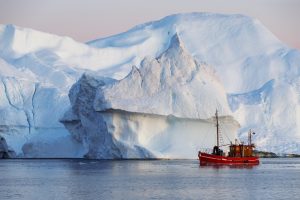India’s Arctic strategy remains in its formative stages, reflecting the relatively undeveloped nature of the country’s Arctic policy. Despite the limited body of literature on the subject, however, a recurring theme advocates for greater Indian engagement in the Arctic to better safeguard and secure India’s expanding interests both in the region and globally.
India’s interests in the Arctic are primarily centered on scientific cooperation, environmental monitoring, and, more recently, resource security. For instance, the Arctic holds significant importance for Indian scientists due to its direct impact on India’s monsoon patterns, which are crucial for the agricultural sector and the country’s overall food security. Additionally, the increasing accessibility of the Arctic presents New Delhi with opportunities to meet its growing energy demands and address its shortage of strategic rare earth elements (REEs) – notwithstanding its awareness that the harsh environmental conditions, high costs of extraction, and the need for advanced technology pose substantial barriers.
A notable, and relatively recent, development in India’s Arctic strategy is the emerging narrative among Indian strategists that posits New Delhi’s engagement with Russia in the Arctic as a strategic necessity to counter the perceived rise of Chinese influence in the region. This discourse seeks to justify India’s push for a greater regional presence, and its close cooperation with Russia, as a means to counter Beijing’s growing interests in the Arctic and its broader influence over Moscow.
India is being portrayed as a counterbalance to China, offering Russia a viable alternative to avoid international isolation and over-dependency on Beijing. Given the perceived importance of the Russian Arctic in addressing India’s energy and mineral security and growing concerns with regard to a China-Russia partnership in the Arctic, enhanced bilateral cooperation between India and Russia in the Arctic is held up as a welcomed alternative to China’s influence; one that would satisfy both India’s and its Western partners’ strategic interests.
In an important sense, this approach is the mirror image of New Delhi’s strategy in Central Asia, where it has sought to counter China’s expanding influence – viewed as a strategic vulnerability – by, amongst other things, leveraging Russian concerns about China’s growing presence. The argument suggests that India’s strategic interest lies in diversifying Russia’s partnerships away from China by providing alternatives in markets, finance, and manpower.
However, much like its strategy in Central Asia, New Delhi’s approach to the Arctic may be unsuccessful for similar reasons. Its strategy appears to be a reactionary stance focused more on countering China than on responding to the specific dynamics of the Arctic region. By emphasizing its close relations with the Arctic 7 (A7) to justify its reliability in working with Russia, India overlooks a critical point: While most A7 countries view China’s growing influence in the Arctic as problematic, they do not consider it an immediate threat to regional cooperation. Instead, it is Russia – the very actor to which India seems eager to anchor its regional policy – that raises the most concerns.
This tension is most evident in the calls to support Russia’s proposal for greater BRICS+ engagement in the Arctic. The reasoning behind this is that coordination between India and Russia within BRICS is crucial to avoid surprises from joint Russian and Chinese proposals and initiatives in the Arctic. However, India’s Western partners are likely to reject such calls as they promote greater multipolarity in Arctic governance – an idea that none of the Arctic states, including Russia until recently, has favored. Arctic states prefer to maintain the current exclusive arrangements in regional governance, where only states with Arctic territory are entitled to participate in and shape the regional governance structure.
India’s support for the Russian proposal, while serving its interests in limiting Russia-China cooperation and Russia’s desire to avoid over-reliance on Beijing, stands in stark contrast to its Western allies’ preference for exclusivity. As a result, it is unlikely to be welcomed in Western Arctic capitals.
Instead of aligning with Russia, India should consider forging an approach with other like-minded non-regional states such as Japan and South Korea, both of which share India’s concerns about the growing China-Russia cooperation in the Arctic and the potential for their businesses to lose out on Arctic opportunities to Chinese competitors. The trio should then advocate within the Arctic Council for enhanced observer participation to rectify current disparities and promote a more inclusive and equitable Council, fostering a balanced Arctic perspective.
To this end, the underlying goal must be twofold. First, to convince the Nordic states, as well as the United States and Canada, to more rapidly open up their Arctic regions to commercial activities thereby providing a real alternative to Russia’s Arctic, where most commercial activities are currently concentrated. Second, to push for a reformed Arctic Council – one with the mandate to debate hard security issues – to avoid polarization and fragmentation in the regional governance system whereby Russia and its partners adhere to one set of rules while the A7 states follow another.

































